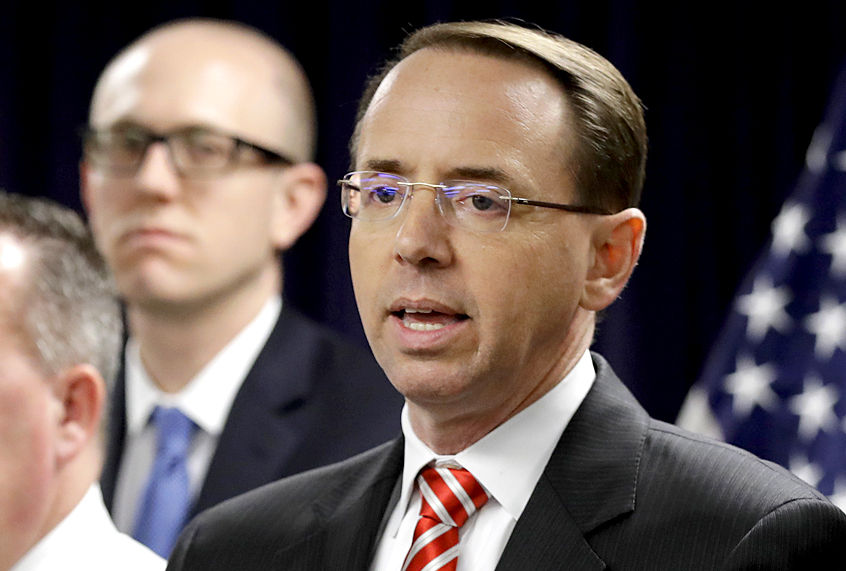A federal grand jury has charged one dozen Russian intelligence officers of hacking Democrats during the 2016 presidential campaign, according to a new indictment in the investigation into Russian interference in the U.S. election led by Special Counsel Robert S. Mueller, III.
The latest indictment targets 12 members of the Russian intelligence service, known as GRU, in a sustained effort to hack the computer networks of the Democratic National Committee, Hillary Clinton’s presidential campaign and the Democratic Congressional Campaign Committee.
Deputy Attorney General Rod Rosenstein detailed the new charges at a midday press conference at the Justice Department in Washington as President Donald Trump met with Queen Elizabeth at Windsor Castle. Mueller did not attend the announcement, as has been his practice.
As President Trump meets with the Queen, Deputy Attorney General Rosenstein announces indictment against 12 Russian military officers, accused of hacking US election. No Americans named in these indictments.
— Lester Holt (@LesterHoltNBC) July 13, 2018
The news comes just a few days before Trump is expected to meet with Russian President Vladimir V. Putin in Helsinki, Finland. Rosenstein said he briefed the president earlier this week on the charges.
The 11-count indictment includes charges of conspiracy by the Russian intelligence officials against the U.S., money laundering and attempts to break into state boards of elections and other government agencies.
Rosenstein said the intelligence agents worked to “hack into computers, steal documents and release those documents with the intent to interfere with the election.”
He claimed the hackers created false online personas, DC Leaks and Guccifer 2.0, in an attempt to disguise the Russian origins of their work. Rosenstein also told reporters that, while the hackers interacted with some Americans in the course of their efforts, those people have not been charged with a crime.
“There’s no allegation in this indictment that any American citizen committed a crime. There’s no allegation that the conspiracy changed the vote count or affected any election result,” Rosenstein said. “The goal of the conspirators was to have an impact on the election. What impact they may have had . . . is a matter of speculation. That’s not our responsibility.”
One line in the indictment was quick to draw attention: “On or about July 27, 2016, the Conspirators attempted after hours to spearphish for the first time email accounts at a domain hosted by a third-party provider and used by Clinton’s personal office.”
As NBC News reporter Benjy Sarlin and others pointed out on Twitter, that is the same day Trump held a news conference in which he infamously declared, “Russia, if you’re listening, I hope you’re able to find the 30,000 emails that are missing.”
Russia has previously denied that its government interfered in the 2016 presidential election.
Since May of last year, Mueller and his team have been probing whether the Trump campaign aided Russia in its efforts to meddle in the 2016 presidential election. According to The New York Times, the special counsel has filed “more than 100 criminal counts against 32 people and three companies. Among the people previously charged are fourteen Russians and three Trump associates who have already pleaded guilty.”
Trump’s former campaign manager, Paul Manafort, was transferred Thursday to a jail in Alexandria, Virginia, where he awaits a criminal trial later this month on charges of conspiracy against the U.S., money laundering and wire fraud, in addition to potential lobbying violations.
The special counsel’s investigation has come under fierce criticism from Trump and his supporters in Congress, who claim it is a “witch hunt” and a politically motivated effort to undercut the president.
Thursday, House Republicans grilled former FBI agent Peter Strzok at a congressional hearing over his work on the Russia probe and an earlier investigation into Clinton’s use of a private email server when she was secretary of state. Strzok defended the FBI and expressed regret for his personal statements showing disdain for then-candidate Trump over the course of a 10-hour hearing.
American intelligence officials and lawmakers have expressed concern that November’s upcoming midterm elections in continue to be susceptible to Russian meddling.
“Foreign elections are critical inflection points that offer opportunities for Russia to advance its interests both overtly and covertly,”Director of National Intelligence Dan Coats told Congress in February. “The 2018 U.S. midterm elections are a potential target for Russian influence operations.”
Friday, Trump said that he plans to tell Putin to stay out of those elections when they meet face to face.
“I know you’ll ask, ‘Will we be talking about meddling?'” Trump told reporters at a joint press conference with UK Prime Minister Theresa May. “And, I will absolutely bring that up. I don’t think you’ll have any, ‘Gee, I did it, I did it, you got me.’ There won’t be a Perry Mason here, I don’t think. But, you never know what happens, right? But, I will absolutely firmly ask the question. And, hopefully we’ll have a very good relationship with Russia.”

